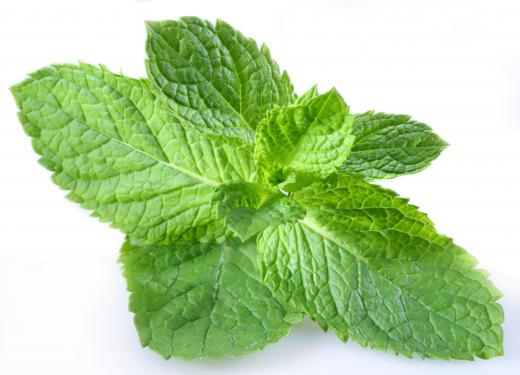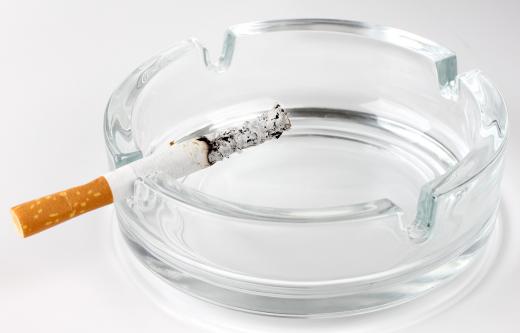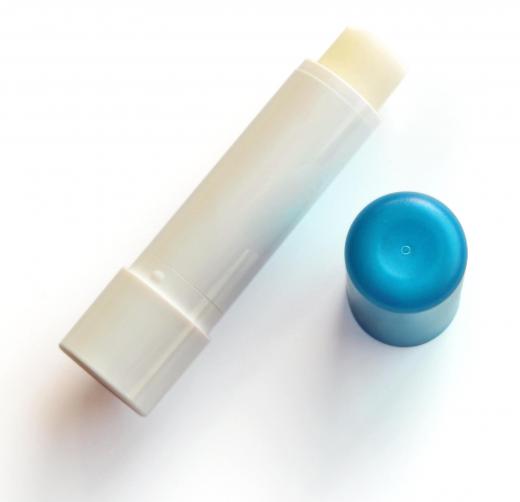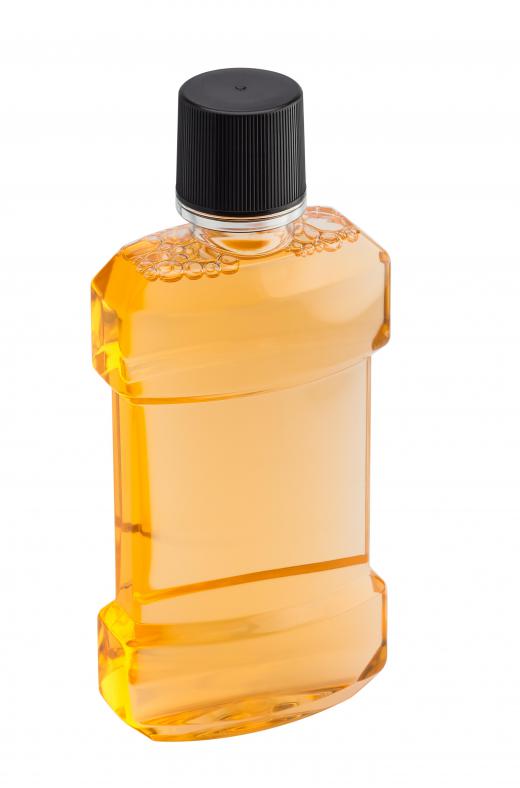What is Menthol?
 Niki Foster
Niki Foster
Menthol is an organic compound with the chemical formula C10H20O that occurs naturally in mint and some other plants. It can be extracted from the leaves by distillation, but is more commonly made synthetically. Pure menthol is a crystalline solid, but it is often used in the form of peppermint oil. It produces a sensation of coolness in the mouth or when applied to the skin and can act as a mild anesthetic. The compound is widely used in cough and cold remedies because of its soothing effects and as a flavoring in candy, chewing gum, medical products and cigarettes.
Manufacture

Mint plants synthesize this compound in their leaves, possibly as a natural insecticide or to discourage predators, many of which appear to dislike the smell. The compound was isolated from peppermint oil in 1771 in Europe, but it may have been in use in Japan in much earlier times. Industrially, it can be obtained from mint leaves by steam distillation, but most menthol is now made synthetically by a complex, but more economical, process. Amateur essential oil enthusiasts can extract impure peppermint oil from the leaves of the plant using grain alcohol or vodka, separating the oil by freezing, but further processing would be required to isolate the pure compound.
Properties and Effects

Although it is a solid at room temperature, menthol can be melted with warm water and readily produces a strong-smelling vapor. It is only slightly soluble in water, but dissolves easily in many organic solvents, including alcohol. Although it is of very low toxicity, it has a number of noticeable effects on the body, which have led to a variety of therapeutic uses.

Menthol stimulates the body’s cold receptors, producing a cooling sensation when it is inhaled or applied to the skin. As with the chemical capsaicin found in chili peppers, which stimulates the heat receptors, the compound does not actually change the skin’s temperature, but merely produces a feeling of cold. The anesthetic properties of menthol are thought to be due to the fact that it binds to kappa opioid receptors. These are cells found in the brain, spinal cord and neurons; among other things, they help control the perception of pain.

Another important property of this compound is that it can act as a counterirritant, that is, a substance that causes mild irritation or inflammation in one place, distracting attention from pain in another. It also increases the penetration of medications applied to the skin. Menthol suppresses the urge to cough and creates a sensation of increased openness in the nasal passages in people suffering from nasal congestion, although it appears to have no actual decongestant effect.
Uses

The cooling sensation produced by this compound, along with its anesthetic and counterirritant properties, has led to its use in products intended to relieve skin irritation, sore throat, or nasal congestion. It may be used to treat sunburn, fever, or muscle aches as well. Most products used to relieve these conditions contain only small amounts of the compound. Pure crystals, however, can be used with warm water to relieve cold symptoms through the release of vapor. It should be used with caution, as inhalation in excessive amounts can cause pain in the nasal passages.

In traditional Asian medicine, menthol is sometimes prescribed to treat nausea, diarrhea, indigestion, headache, cold or sore throat. When used as a supplement for health reasons, it is usually taken in the form of peppermint oil. Products that commonly contain it include toothpaste, cough drops, lip balm, mouthwash and chewing gum.
Menthol is sometimes added to cigarettes to improve flavor and give a sensation of coolness. There is evidence that people who smoke these cigarettes are more likely to suffer from serious health problems, although it is not generally thought that this is due to any direct effects of the chemical. It has been argued that the flavoring may make cigarettes more palatable to young people. A study in 2012 suggested that youngsters who smoke menthol cigarettes are 80% more likely to become addicted. It is also possible that people who smoke these cigarettes may inhale more deeply and retain the smoke in their lungs for longer, increasing the quantities of toxic and carcinogenic compounds that are absorbed.

A relatively recent use for the compound is as a natural pesticide. It is an active ingredient in some products used to control mite infestations on honeybees. Used at the right concentration, it is effective in killing the mites, but not harmful to the bees. As of 2013, given the level of interest in the use of natural products in the control of pests, this compound may find further similar uses.
AS FEATURED ON:
AS FEATURED ON:



















Discussion Comments
I'm addicted to spearmint leaves. I have been eating them every day for half a year. Is this a good thing? Is the menthol in it making me addicted?
I use cough drops menthol and mint(polo) in once a day.
How could it affect me?
Menthol doesn't damage your lungs. Your husband felt a cooling sensation on his lungs because he inhaled the menthol cigarette smoke. This is quite normal. He probably suffered a panic attack in response to it and that is why he was out of breath.
People who have not tried it before may panic the first time. It's best not to inhale smoke anyway. Your mouth and tongue are enough to absorb the nicotine.
@MikeMason-- I'm not an expert, and I'm sure your doctor would be a better person to ask. But I think that menthol is generally safe unless someone is allergic to it or something.
Products with menthol does cause a sort of burning or cooling sensation at first, especially the skin products and eye drops. Some people get scared when they feel this but it's normal. It's usually that sensation that helps relieve pain and irritation.
I guess menthol is good for a lot of different things, looking at all the products it's used in.
I wonder if long-term use of menthol has any negative side effects though?
@Rob-- I just found out how menthol relieves pain. I have an all-natural topical balm that I use for muscle soreness. I was looking at the ingredients the other day and noticed that the main ingredient was menthol oil. Next to it, it said "topical analgesic."
So I guess menthol relieves pain by reducing our sensitivity to it. It sort of numbs the pain. It's really great though. This is the only product that helps with my muscle soreness.
@shell4life – Not all menthol tastes like peppermint. Even cough drops that contain menthol can be found in many flavors. My favorite is berry flavored.
These actually taste so good that I find myself wanting them even when I'm not sick. While I can't taste the menthol, I can definitely feel it. It becomes easier to breathe, and I can swallow without so much pain.
However, peppermint flavored cough drops shouldn't make you sick. Peppermint is actually a remedy for nausea.
Do menthol cough drops taste like peppermint? I don't think I could stand sucking on something that tasted like mint while I'm sick. I usually get nausea along with the sore throat, and the flavor might push me over the edge and make me vomit.
Menthol cigarettes can tear your lungs up if you aren't used to them. My husband was a smoker, but when he tried a menthol cigarette after having smoked regular ones for years, he said it felt like his lungs were turning to ice, and it was really hard to breathe.
I'm glad that he didn't become addicted to them. He was able to quit smoking, but I think it might have been harder to quit if he had been used to menthol cigarettes.
I use a salve containing eucalyptus and menthol whenever I have chest congestion. I rub it right on my chest, and it starts opening up my airways immediately.
The smell drifts up to my nostrils, which have usually been clogged, as well. However, they open right up, and I get relief, even if its only for a short while.
It's really hard to sleep when you have chest congestion. Whenever I wake up in the middle of the night coughing, I reapply the salve, and I can go back to sleep.
I don't think one should underestimate the power of menthol inside the body. It should only be gently consumed.
How does menthol relieve pain?
My friend is constantly rubbing her sore muscles with menthol creme. Are there any side effects to the brain from doing this?
menthol smokes are the bomb! i can see why most peeps smoke menthols!
how many riccola cough drops would you have to consume to get menthol poisoning?
Does taking cough drops cause bowel irritability such as gas and diarrhea?
can menthol cough drops be habbit forming?
How long does the smell of the menthol last on the breath? Could this smell be mistaken for the smell of alcohol?
dose, time, ratio, containers of mouth wash and Menthol and Eucalyptus inhalation.
In cigarettes with menthol, are they more addicting because they also produce numbing, or sensation effects?
The cooling effect of menthol numbs and soothes the skin a bit, though it's not as strong as other pain relievers. Cough drops without menthol do not make the mouth and throat feel cooler; they just lubricate. Some cough drops also contain an anesthetic, such as benzocaine, and/or a cough suppressant, like dextromethorphan.
um... on halls it says it is menthol. sooo what does it mean? how is it different from other cough drops that are not menthol?
How does menthol relieve pain?
Post your comments